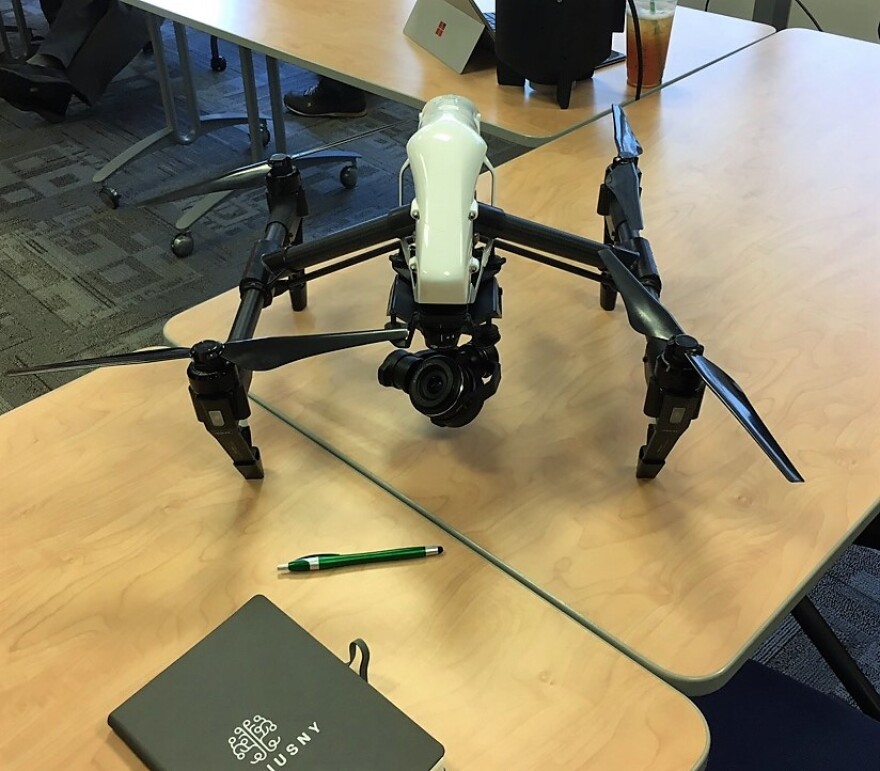Six finalist companies participating in the GENIUS NY program in Syracuse are receiving their share of more than $3 million dollars in investments from Empire State Development Corporation. They’re creating new innovations at the Tech Garden to advance UAS or Unmanned Aerial Systems that supports the many applications of drones.
Some of the innovations range from helping grow agriculture to solutions for urban planning. Co-founders of Dropcopter Adam Fine and Mike Wench created their company to pick-up where declining bee populations left-off.
“We are looking to bring our combination of drone related pollen distribution to New York’s upstate area. We see declining bee populations as a crisis for food growers and so Dropcopter is about making the most of the resources we have so that we can meet the food production needs we’re going to see in the next ten years," said Wench.
Fine says the company has plans to further expand on the pollination of crops. Right now, they’ve been focusing on supporting almond growers.
“Now that we almost have that under control, we’re going to move into different crops. Next will probably be cherries because it’s a seasonal business. Cherries bloom after almonds do, and then after that come apples."

Another company thinks it could supply instrumental data to urban planners who are determining what should replace the I-81 overpass through Downtown Syracuse. Zachery Halbert from Quantifly specializes in UAS imaging technology.
“We can provide urban planners with a map every hour, over a period of several days so they can see how pedestrians are using the space, how bicyclists are using the space. How walkable is Syracuse? How does the city function around 81 and how can we use that data to make a more informed, wise, intelligent decision on what we should do with that space."
Six teams will remain in the year-long incubator and will present to judges their pitch for one of three top prizes on April 12th.
The six finalists selected for GENIUS NY 2.0 are:
Dropcopter (California) is an agriculture technology startup that has developed patent pending technology to allow farmers to pollinate orchards via drones. The recent decline of bee populations has raised pollination prices significantly, creating a compelling market for alternative technologies such as Dropcopter.
Fotokite (Switzerland) combines aerial and ground-based robotics with patented flight control algorithms to create a kite-like tethered drone system, which actively uses the tether to fly for 24-hours fully autonomously. < not available today>
Precision Vision (New Mexico) creates image processing technology that makes real-time precision imaging an affordable reality. Precision imaging locates each pixel at a known 2D or 3D, referenced location in every image. The company has unique software and knowledge to provide low-cost, real-time precision imaging to open new markets.
Quantifly (Michigan) is an IoT solution that simplifies and reduces the costs of parking and traffic studies through the unification of UAS, machine vision, and analytics by eliminating human error, mitigating safety risks, and centralizing harvested data. They are the first to market, and their solution aims to be the quintessential app for urban planners focused on smart city applications and sustainability.
TruWeather (Virgina) is building a service to improve the precision, accuracy and communication of weather intelligence specifically for the UAV enterprise. They will develop, commercialize and market the Unmanned Aerial Vehicle (UAV)Weather Risk Management Service for Beyond-Line-of-Sight (BLOS) UAV operations and offer it as a SaaS business.
UsPLM (Syracuse) provides a collaborative environment for all stakeholders to develop, test, deploy, and safely operate a single or a fleet of UAS. UsPLM can integrate UAS, Internet-of-Things (IoT) and Product Lifecycle Management (PLM) technologies, which is missing in the current UAS ecosystem.




